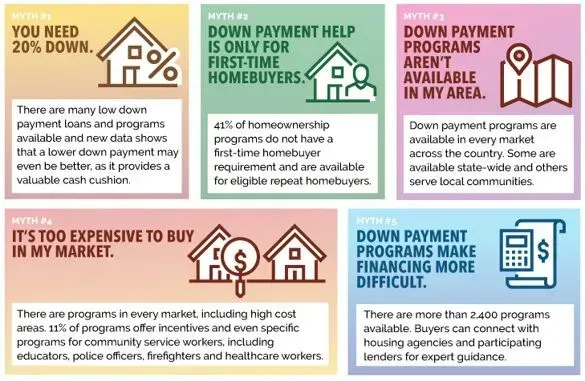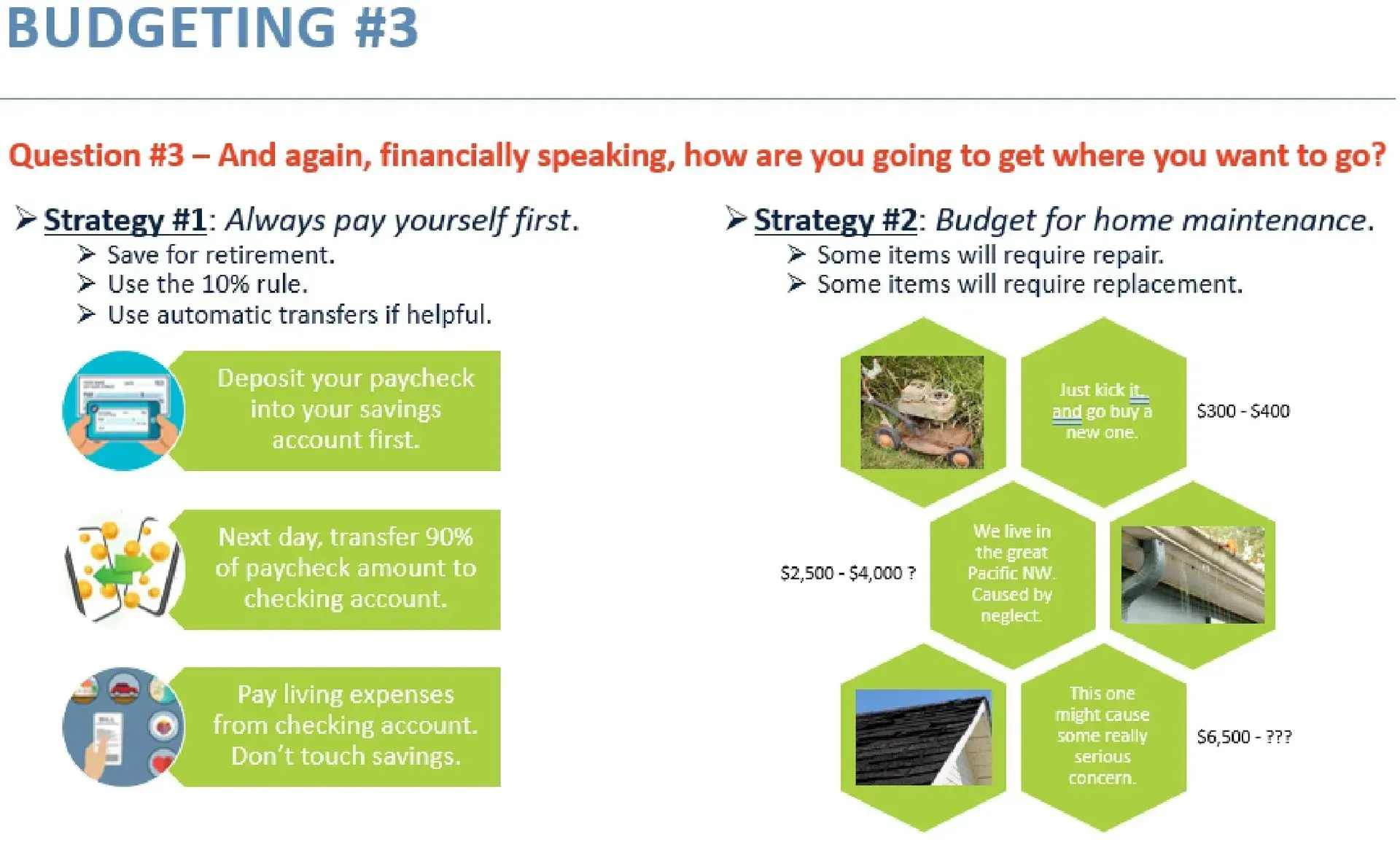Blowing The Five Greatest Mortgage Myths Out of the Water!

If you want to buy in today's market, you need to be well informed! It's amazing that so many first time homebuyers still believe in the five greatest mortgage myths of all time, because they haven't been true for decades. I can't begin to tell you how many homebuyers I've worked with over the years who started out with the same bad information. As I've worked to help them retool their knowledge, and empower them with current information, I've found that the misinformation usually comes from two main sources.
The first source is understandable. Because homes are so expensive, homebuyers want to be wise with their money, and seek out the experiences and advice from their friends and loved ones - it's just the normal thing to do. But if their parents bought their last home ten years ago, and they rely on their parents' advice, then they're relying on information that is totally out of date. If they're trusting information from their older siblings who bought homes just 3-5 years ago, the guidelines on a particular subject could have changed dramatically. If they're drilling down into the information from their best friends who just closed on a house last month, please listen and hear what I'm telling you when I say that no two situations are EVER the same! So the only scenario that can be considered is YOURS, and if you try to do it differently you're already making mistakes that could easily be avoided. And that means that you need to find a mortgage loan originator who will take the time to answer your questions - all of them - even if you ask the same question 3, 5, or even 19 times. The one you select needs to do that for you. I'll cover how to find such a loan officer in a later blog entry, but for now, just know that you need to do your own research, and find a loan officer who works full-time in the mortgage industry.
The second source of bad information is the mortgage industry itself. I've met mortgage loan originators who found it all too easy to gloss over loan terms, explanation of mortgage terminology, why things have to be done a certain way, who don't want to go the extra mile to make sure that their clients have a good understanding of what's going to happen as they go through the mortgage process. Heck, people don't want to seem dumb, so after the second or third time asking the same question, they usually just say "OK" and move on. It's incumbent on a mortgage loan originator to repeatedly ask "Are you with me", "Do you understand that", and "Are you OK for me to move on to the next subject?" If they don't do that, they're just perpetuating their client's lack of knowledge. But let me put it a different way... If you're not working in the mortgage industry every single day of the week, there's no way for you to know what you don't know. But it is most definitely a loan officer's job to discover that as he/she works with you, and then to make sure that you understand what's happening in your pursuit of a mortgage. That's just good business, plain and simple.
In that pursuit, over the course of the next five weeks, together we're going to demystify the top five mortgage myths of all time, and blow them out of the water. So stay tuned! Next week - You Need A 20% Down Payment (Bah, Humbug! Very few of my clients had 20% when they bought their first homes).

Home Mortgage Loan Reviews
Cierra & Jonathan
Jim was absolutely instrumental in our first ever home purchase! He welcomed all of our questions with such warmth and his expertise and respect for our budget made it possible for us to buy the house of our dreams in a market that sometimes felt impossible. We are so grateful to have worked with Him.
Mikahla M.
Jim was amazing and took fantastic care of our mutual clients! He is very communicative and detail oriented, highly recommend!
Tracy H.
I’m always impressed with Jim’s knowledge. If you have questions about home loans and what’s best for you, give Jim a call!
Autumn E.
What more can I say other than how much money he saved me! I went from a mortgage that was drowning me to $800 less per month… That’s beyond HUGE. His whole rate and more secure fabulous rate and more fabulous mortgage payment!
Andrea S.
Jim was very informative in providing details, helping us to select the best loan, and guiding us to the best rate. He walked us through the process of filling out the loan paperwork and was in constant communication throughout the process.
Emma B.
Jim, from start to finish, has been our golden ticket during the process of buying our first home. We met Jim through the homebuyers education class he hosts and we knew right away he was a perfect fit for us. He’s honest, easy to get hold of and efficient. We can’t thank you enough, Jim - you’re the best of the best!
Rachel C.
Jim was very pleasant to work with he understood and worked with all our needs, and made us feel comfortable and confident in our choices. It was a great experience with great communication with everyone involved. We are happy with what Jim provided for us.
Debrah J.
Jim was great to work with. The process was speedy and seamless. We were well informed all along the way.
Mary D.
We have worked with Jim for many years when we purchased our homes or refinanced. He is very knowledgeable about the financial market and transparent. We appreciate that he has our best interest at heart, even if it may not benefit him. Jim is very responsive and we are extremely pleased to have worked with him again on our home loan needs. We absolutely will refer our friends and family to him!
Gerald C.
The outstanding service from Jim and his team was exceptional. The process was painless. And any issues that arose were dealt with quickly and professionally. I will highly recommend.
Tess L.
As first-time homebuyers, we were very nervous about all the complex pieces of this process. Jim was very patient with us and explained everything in detail and answered all our nervous questions with patience and understanding! Could not recommend more!
Jose A.
Jim has been fantastic with us! He has been prompt, honest, professional & a pleasure. I would recommend. 10/10! We look forward to working with Jim for the rest of our lives.
Samantha W.
Jim was amazing, the whole team took care of us and was always there. Thank you!
Adam M.
We had a great experience with Jim. We started in a home buyers class in June, 2016, and he coached us several times even before we were actually ready to buy. He told us exactly what to do, and when and how to do it. He was always available to meet when we needed him, including after regular business hours.
Brian F.
Jim was so responsive and extremely patient with all our questions. And the best part was that there weren't any negative surprises! We will certainly refer others to Jim.
Britt J.
From start to finish Jim has helped us every step of the way. We had many, many questions that he was more than happy to walk us through. We highly recommend using Jim Eyre and his team.
Matthew W.
Jim has been incredibly helpful and a pleasure to work with through the entire process, not only with paperwork, but also personally. Thank you so very much!
Browse My Website
Contact Information
Phone: (425) 210-2963
Email: jeyre@nexamortgage.com
Operating From 13320 Hwy 99, Unit 197, Everett, WA 98204
License: NMLS #442452
Corporate NMLS # 1660690
All Rights Reserved | Jim Eyre




